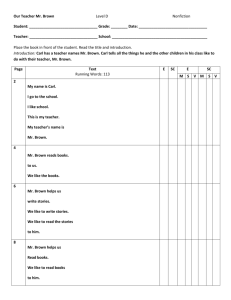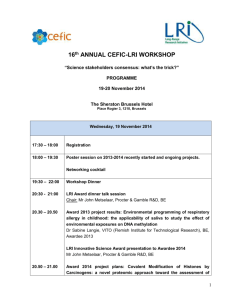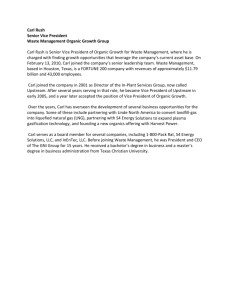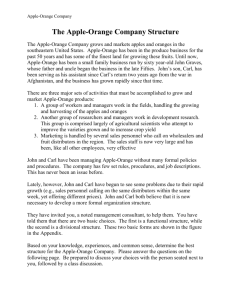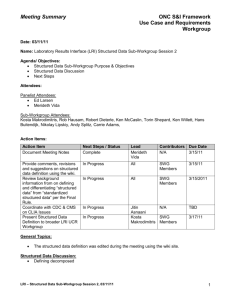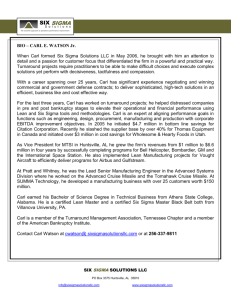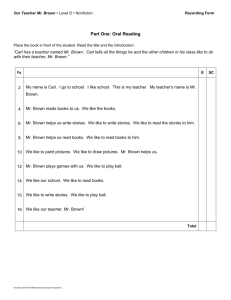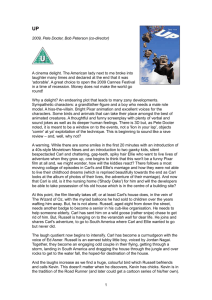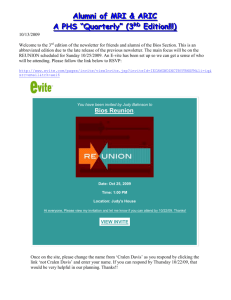here.
advertisement
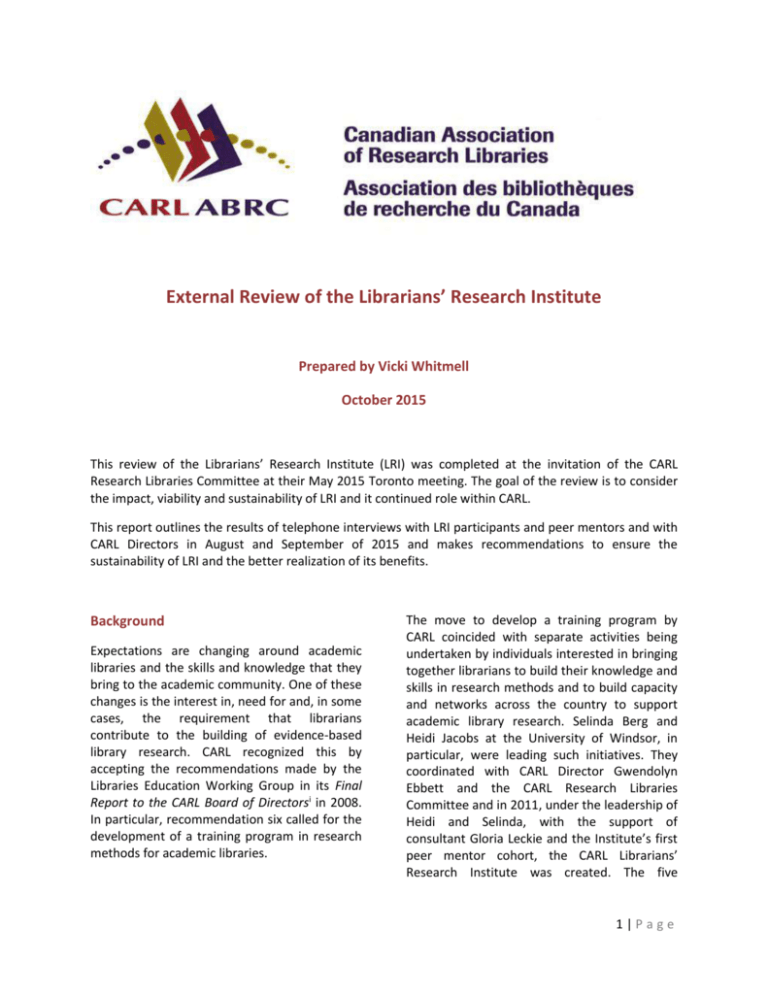
External Review of the Librarians’ Research Institute Prepared by Vicki Whitmell October 2015 This review of the Librarians’ Research Institute (LRI) was completed at the invitation of the CARL Research Libraries Committee at their May 2015 Toronto meeting. The goal of the review is to consider the impact, viability and sustainability of LRI and it continued role within CARL. This report outlines the results of telephone interviews with LRI participants and peer mentors and with CARL Directors in August and September of 2015 and makes recommendations to ensure the sustainability of LRI and the better realization of its benefits. Background Expectations are changing around academic libraries and the skills and knowledge that they bring to the academic community. One of these changes is the interest in, need for and, in some cases, the requirement that librarians contribute to the building of evidence-based library research. CARL recognized this by accepting the recommendations made by the Libraries Education Working Group in its Final Report to the CARL Board of Directorsi in 2008. In particular, recommendation six called for the development of a training program in research methods for academic libraries. The move to develop a training program by CARL coincided with separate activities being undertaken by individuals interested in bringing together librarians to build their knowledge and skills in research methods and to build capacity and networks across the country to support academic library research. Selinda Berg and Heidi Jacobs at the University of Windsor, in particular, were leading such initiatives. They coordinated with CARL Director Gwendolyn Ebbett and the CARL Research Libraries Committee and in 2011, under the leadership of Heidi and Selinda, with the support of consultant Gloria Leckie and the Institute’s first peer mentor cohort, the CARL Librarians’ Research Institute was created. The five 1|Page objectives of the first Institute held in 2012 were: To provide practicing academic libraries in Canada opportunities to immerse themselves in sustained conversations and activities related to scholarly research, inquiry and publishing; To provide librarians with an intensive workshop experience intended to take their current research projects to the next level as well as provide librarians with the opportunity to meet other researching librarians from across Canada; To provide Institute peer mentors an opportunity to connect with other Canadian librarians with active, sustained research agendas; To allow each CARL library an opportunity to send at least one librarian to the inaugural offering of the Institute so that they may return to their home institution to share their knowledge and enthusiasm about research with their peers and colleagues; To work toward building an infrastructure for librarian research across Canada and to develop a community of our own researchers in CARL libraries.ii The first Institute was held in 2012 at the University of Windsor. Institutes followed in 2013 at the University of Regina, in 2014 at Carleton University and in 2015 at Simon Fraser University. The LRI is well attended and attracts a solid group of peer mentors and plenary speakers each year. The Review In conducting this review, I undertook telephone interviews with 43 individuals which included CARL Directors, peer mentors and LRI participants. In addition I reviewed written comments from participants either directly to, or through, a CARL Director. Overwhelmingly the comments were very positive about the delivery of the LRI curriculum and program and the enthusiasm and inspiration shown by participants upon their return to their institutions following the program. Interviewees identified important benefits to many of the participants and peer mentors, including building their confidence and research skills and developing a network of contacts. There was anecdotal evidence of benefits to the libraries, although the long-term impacts have yet to be determined or measured. Almost everyone felt very strongly that the Institute is the proper role for CARL and that it fits with its mandate. The words ‘absolutely’ and ‘definitely’ were often used in response to the question about CARL’s connection with LRI. Many wondered who else would provide such training and development if CARL didn’t and felt that LRI fit closely with CARL’s Core Competencies profileiii and its strategic planiv goal to build the capacity of Canadian Research Libraries and develop expertise for new and emerging roles. Many described it as highly successful and put forward the hope that it continue. A few questioned CARL’s continuing support for LRI, since CARL’s role is primarily to be an advocate for CARL libraries. Instead, they felt that this kind of training and development is the responsibility of library schools and that it is this group that should provide the needed training and development either through the Masters level curriculum or through professional development courses following graduation.v Some concern was expressed about the longterm sustainability of LRI given the small number of Canadian academic libraries which limits the number of possible participants and, most importantly, peer mentors and program chairs. However, most CARL Directors spoken to had staff ready and interested in attending LRI 2|Page and they expect that with demographic change and new hires that more would be available to attend in the future. Some of the larger CARL libraries would be pleased to send more than the allotted one attendee to each Institute. Non-CARL libraries have already been invited to attend LRI, but this has been limited. Generally many felt that this is a proper approach to expand the market for LRI but it would need to be limited with first choice for registration given to CARL libraries. Overall it was felt that only academic non-CARL libraries should be invited and that they be charged an additional fee to cover any associated costs. Concern was expressed about the administrative burden on CARL staff to organize LRI and the financial cost of the Institute to CARL. There was little support for having a dedicated paid staff for LRI feeling that it was not needed or required. CARL Directors were divided on whether CARL should subsidize LRI beyond administrative support or whether sponsorships could be approached to help support LRI. Two CARL libraries offered to financially sponsor the Institute. Almost all CARL Directors were in favour of paying a higher registration fee to attend the Institute as long as it was a reasonable amount. The main concern that emerged again and again with participants, peer mentors and CARL Directors was the difficulty for individuals to maintain momentum and enthusiasm and to move forward on their research initiatives following LRI. Some CARL libraries provide time for conducting research and publishing activities but many do not. While some individuals are motivated by tenure requirements or personal goals, many find it difficult to find the time to carry their projects forward in the months and years following their attendance at LRI. Peer mentors, participants and CARL Directors suggested that more follow-up is needed immediately and over the long-term for LRI alumni. A few libraries reported that bringing peer mentors to their libraries following the LRI was an excellent way to encourage research and to provide good follow-up. Peer mentors reported on the large amount of time needed to participate actively in the Institute and to provide follow-up to participants, especially during the years when the program is revised. Some said that the amount of time needed means that they are not able to participate as often as they would like. The Institute has inspired research communities of practice at individual libraries (a number of CARL libraries reported this) and in cities or regions (one has been formed by the Montreal area academic libraries). A provincial group was formed in Nova Scotiavi following a visit by Kristin Hoffman, a LRI Program Chair. It brings together more than one hundred librarians interested in conducting research from different types of libraries across the province. It appears likely that such communities of practice can help to supplement and sustain the energy coming from LRI. While there was not a specific question around the governance of LRI a number of those interviewed had concerns about how decisions are made about the Institute and the uncertainty around if and when it will be offered each year. Practice has been that a decision about holding the Institute is often made only a few short months before it is to be held. This makes it difficult for the program chairs and mentors to make needed changes to the curriculum and for participants to plan to attend in advance. It also hinders the development of a long-term plan for the Institute and assurance that qualified peer mentors will be available in the future. 3|Page Recommendations Response to the LRI from the people interviewed and from comments received was overwhelmingly positive. It is obviously a program that CARL should be proud of. It has met its goals to develop needed research skills for academic librarians. While CARL could leave the development of such important skills to the individual library or to regional groups or associations, the beneficial holistic approach of the LRI and the gains that come from gathering academic librarians together from across the country cannot be replicated. If CARL decides to continue LRI, and this is recommended, there are changes that could be made to ensure that it is sustainable and that the benefits are better realized. 1. Institute a formal LRI mentorship program To continue the momentum gained from attending LRI a formal mentorship program should be initiated to pair LRI alumni with mentors at the local level. These mentors could be librarians with knowledge and skills in conducting research (perhaps from a local library school) or could be faculty members from the participant’s home university. If possible, the mentor for each participant should be identified prior to Institute to ensure that proper support is in place for the Institute participant’s return to the workplace. In addition, each participant should be required to set specific goals and timelines to move their research forward. These should be specific to each individual and attainable and measurable. Regular reporting on progress to a peer mentor from the Institute should also be required. 2. Sponsor a regular CARL-hosted forum or workshop to hear from LRI alumni on their research. A number of interviewees mentioned the value of finding a way to share research being done with others. At the time of writing it is unclear if the CLA annual conference will continue but a CARLsponsored forum at the OLA Superconference or other provincial or regional library or scholarly association conferences should be considered to share research and build networks. An advanced LRI was of interest to a number of interviewees. It could be held in conjunction with a CARL research forum. 3. Open up and publicize the portal of research projects and encourage LRI alumni to contribute to it. A portal of research projects was developed but has not be fully utilized by the LRI alumni and it has not been open to the wider library community. The portal should be made public and expectations put in place that alumni will contribute their research work to it. It will take time to grow but could be a wealth of information in the future. 4. Link the CARL Research in Librarianship Grant to LRI. The Research in Librarianship Grant supports librarians’ active engagement in research activities. It is currently given to established librarians working in a CARL member library or to a current library and information student and newly appointed librarians working in a CARL member library. Further qualifying the grant for those who have attended LRI would demonstrate CARL’s support for LRI and could increase participation and attendance 4|Page at the Institute. Awardees should be required to contribute their research to the CARL portal of research projects. 5. Develop a five-year plan for the Institute A five-year plan is required that will determine and outline dates and locations for the Institute, identify the key individuals to be involved and establish timelines for the next five years. The plan should include a budget forecast that will consider all costs and the proper revenue streams needed to break even. The plan should be written in consultation with past program chairs, peer mentors, participants and hosts. This plan will allow proper planning to ensure sustainability and to ensure that there is a qualified cadre of program chairs and peer mentors for future Institutes. Consideration should be given to holding the Institute in a central location in order to reduce transportation costs for participants and peer mentors. 6. Determine the Proper Governance for the Institute The Institute should be formally recognized as a part of CARL and policies approved on how and when decisions will be made and who will make them. There should be clear expectations laid out as to how the Institute will be accountable to the CARL Directors. 7. Open up the Institute to non-CARL Academic Libraries When space is available CARL should open up registration to non-CARL academic libraries. This should increase the long-term viability of the Institute by increasing the pool of possible participants. Non-CARL participants should pay a higher fee than CARL participants in recognition of CARL’s contributions to the Institute. 8. Outsource the Administration and Marketing of the Institute. Outsourcing the administration and marketing of the Institute would reduce the administrative burden on the CARL office to organize and maintain the Institute and should increase its reach. One possible group to outsource the Institute to is the Education Institute, a project of The Partnership, “Canada’s national network of provincial and territorial libraries.” This Institute has a solid brand among Canada’s library community and experience in marketing and organizing conferences and workshops. A clear memorandum of agreement between CARL and the outsourcing group would have to formalized to determine ownership of the curriculum and overall governance of the Institute. CARL’s logo and name should be incorporated into the name of the Institute and should be prominent on all marketing. 9. Offer the Institute in the French Language French language CARL libraries have been unable to participate in LRI in the same way as English speaking CARL libraries. To meet the needs of this smaller group CARL should consider offering a French language institute every three or four years. The English language Institute would be offered the other years. 10. Measure the Impact of LRI Formal measures need to be established and research undertaken to determine the real impact of LRI, especially on individual careers and on the building of a research culture within CARL libraries. While there is anecdotal evidence that the impact has already been felt, this needs to be properly measured and studied and report back to CARL. 5|Page Conclusion There is strong support for the continuance of the CARL Librarians’ Research Institute by CARL Directors, peer mentors, program chairs and participants. Changing demographics and the growth and interest in conducting research indicate that there is a solid market for the Institute among CARL libraries over the next few years if proper planning and policies are in place. There are opportunities to increase the market to non-CARL academic libraries. The benefits of the Institute are not just to the participating individuals and their libraries and universities. CARL benefits by ensuring the development of the competencies required of academic librarians and raising its profile among staff in CARL libraries. This in turn will continue support and understanding for CARL and its activities and advocacy work. Footnotes i Canadian Association of Research Libraries. Libraries Education Working Group: Final Report to the CARL Board of Directors. Ottawa: CARL, 2008. ii Berg, Selinda and Jacobs, Heidi LM. “Beyond the Four Days: Looking to the Future of the Librarians’ Research Institute: A Librarians’ Research Institute Self Study Submitted to the Canadian Association of Research Libraries,” March 2015. iii CARL Core Competencies for 21st Century CARL Librarians. http://www.carlabrc.ca/uploads/pdfs/core_comp_profile-e.pdf iv CARL Strategic Directions May 2013 to May 2016. http://www.carl-abrc.ca/uploads/Publications/2012-1115%20CARL%20Strategic%20Directions.pdf v Although all of Canada’s library schools offer basic research courses, few students take advantage of advanced courses in research methods or choose available thesis writing options. At the University of Toronto where I teach many students enter with the idea of becoming academic librarians. However there is no ‘stream’ for this area of specialization and little guidance given to students as to the importance of developing research skills. Students make individual choices for their courses and it is unlikely that many students will graduate with a high level of research knowledge. Leaving the teaching of research skills to library school would also not have the benefit of developing a network of research contacts across the country, a benefit of LRI. vi Duggan, Lou. Proposal to Start a Libraries NS Research ‘Work in Progress’ Support Group. [Halifax, NS]: Libraries NS, April 2015. https://librariesns.ca/sites/default/files/work_in_progress_group_proposal_apr2015.pdf. A discussion with Mr. Duggan on October 5, 2015 indicated that much progress is being made. For more information he can be reached at St. Mary’s University at 902-420-5174. 6|Page Appendix A SUMMARY OF RESPONSES Summary of Responses from Peer Mentors Q. What do you see as the role of the peer mentor in LRI? Developing and delivering content Being there for discussion and ideas Build capacity for other librarians Provide guidance and facilitation There is learning for mentors as well as participants Curriculum planning/facilitation/maintenance and checking in after LRI. Follow-ups need to happen This is a librarian-driven institute. The role of mentors is to facilitate this Help academic librarians realize their research potential Original intent was to develop longer term connections with participants. This hasn’t been realized. Q. How much time/effort did you spend preparing for LRI? How much time did you spend in follow up with the participants? Was this more or less than you expected? About what I expected Used feedback from previous year to modify curriculum Didn’t do a good job in keep up with mentoring group Given lots of leeway to develop content Hours and hours, but time well spent. It was really fun 1 ½ hour every 1 to 2 weeks for 4 months. It varies each year Time has decreased over the years. More time needed in 2015 with the changes in curriculum made 7|Page Didn’t feel I really mentored any particular group. Moved around between modules. Met a couple of times with them. Q. How were you supported by your university to be a peer mentor? Very supportive No release from regular duties. Did on my own Seen as part of my role and service to the profession. Q. Has being a peer mentor helped you with your research/publishing? No necessarily. I think of it as helping others It should have Made me want to learn more My productivity with faculty increased Made me think differently about research A motivation to do research Felt isolated and alone as a researcher, but now I am more connected. I now advocate for the importance of research by librarians Helped to see things in a different way Gained expertise in providing constructive feedback Q. Have you brought back what you learned/were exposed to at LRI to your university? No forum for this where I am Indirectly through presentations/sharing/talking about my experience Involved in projects with others The culture is changing at our library because of LRI. More new librarians are interested in research. Q. During the planning did you find it easy to keep up with arrangements, plans, curriculum development and changes? Yes. Used email and Skype Exciting to help produce something different Responsibilities were divided up. It worked well. 8|Page Q: Is LRI a good role for CARL? Definitely This needs to be done Its about “research, not just research support.” It is a shift from just supporting the research of others to doing research. The focus is on learning, not just output. Learning about how to be a researcher and why. Understanding how long it takes to learn to do it well LRI is peer-to-peer collegial, but an organization of the CARL Directors who often don’t do research Connects non-directors with CARL No one else to do it However, some frustration with CARL. Insufficient communication between CARL and the organizing group Needs to be a national platform Brings together groups from across Canada Can there be a presence at the regional level, e.g. at OLA to share progress and keep it going? Perhaps an LRI alumni: changing culture and developing network Q. If you could change anything about LRI and how it is planned, organized and taught what would it be? Need a long term vision and approach. It is still looked at one year at a time, with little notice Need to revisit peer mentor/program chair for long term Succession planning is important and needed It is unclear who is making the decisions as to its future and its curriculum. This hampers planning Need continuity with mentors. Each year we start from scratch Uncertainty makes it difficult What is the continued role of the founders? Should meet in person ahead of time to plan the institute Need more continuity between mentors and groups Important to have good representation in all areas of expertise What happens after LRI is important How are peer mentors chosen? The role of chair needs to be clarified Need for succession planning Make better use of alumni. They are now large enough for an interest group to be developed and created. It should be self driven 9|Page LRI needs to be packaged to the audience. People have different expectations for attending Find a way for librarians interested in research to not feel isolated Improve communication between organizing group and CARL Directors. There needs to be proper acknowledgement of work being done How are decisions made? Who makes them? Not enough notice that an institute will be held Have more one-on-one sessions Q. Should non-CARL libraries be able to send their staff to LRI? Must be a baseline for participation to demonstrate interest and commitment to research Could they be mentors? Fantastic idea LRI must decide what it wants to be. May need to expand because Canada has a small market Would expand pool. Research culture needs to be inclusive, not exclusive Would have to change how to advertise since it is now done through CARL Directors Would assist with funding Q. What advice would you give to new peer mentors? To focus on their areas of expertise Be willing to learn from everybody No one is an expert. I was impressed with the participants Look for cross-institutional partnerships ‘Go for it’: You will get a lot out of it Takes lots of preparation and follow-up consultations Q. Would you encourage the development of a more advanced LRI? Good idea, but not sure what it would look like There is lots to cover Focus on knowledge translation: how to take what you have done and change practice. Libraries are not good at this LRI has a holistic approach. It is not focused on methodologies More group work, e.g. data visualization, methodologies 10 | P a g e There is value in bringing people together. There is no national forum to discuss library research in Canada People are looking for deeper connections and reconnections to move their research forward Could this be done online? Very useful. Follow-up individually or with group, e.g visit to a library Might want to hold in conjunction with a provincial or regional conference Would have to be very focused. Open to people at a particular spot in their research There is lots to learn Would reinvigorate skills and interest There is a broad spectrum of those who attend. An advanced LRI would work for some but not all. Suggest teaching in specific methods Who would teach it? Would need experts at an advanced level Q. What advice would you give to CARL Directors re LRI? Maintain it. Support it. Keep it going Add a French language Institute Keep funding LRI We can take instruction from our faculty, but we are different from them. Important for librarians to understand why they should be at the table and what they bring to it Address administrative and succession planning issues There is much interest in it and it is generating attention from outside. There is an opportunity to go bigger A worthwhile institute with positive experiences for everyone (mentors, participants) Determine who ultimately has the decision-making power. Perhaps a comparable set up to NELI with group overseeing with authority to make decisions. Roles need to be defined Those involved previously could act as advisors Structure within CARL needs to be formalized with formal communication Important because it supports the rank and file of CARL libraries There is interest outside of Canada Needs established timelines It is an uphill battle to get the research culture spread throughout libraries Be clear as a group what want LRI to be and to do for academic libraries CARL should be commended for taking on LRI. Better and ongoing communication is needed between CARL committee and mentors. Geographic location is very important. It must be accessible At SFU conference used hotels instead of dorms. This was liked. Impacts how people can function and perform. Being well rested 11 | P a g e Would have more strength in instruction and teaching if peer mentors dedicated to several years. When change each year lose momentum and content must be reworked. Would help to develop confidence of mentors. Q. Any final comments? Very positive Would like to participate in the future Cross-institutional research is very important. LRI is key to helping identify colleagues and partnerships LRI is making a change in the long run Keep it More collaboration with CAIS? How can we more properly acknowledge the work of the peer mentors? Being asked to ‘reapply’ can be demoralizing Would like to speak directly to CARL Directors. “Want a voice.” Many of those involved must do planning and mentorship on top of their regular duties. For this reason peer mentors unable to commitment to ongoing participation. Succession planning is important. Consistency from year to year is important Would like to see librarians attend academic conferences. It is important to talk to faculty in the disciplines. E.g. Society for Teaching and Learning in Higher Education Participants are often unsure of what to expect, but feedback was that the Institute exceeded expectations. Gave them a stimulating environment and networks were developed. Summary of Reponses from Participants Q. What were your goals in attending LRI? Become more comfortable with research and to develop my competencies To get help and develop partnerships. See and hear the level of conversation around research Increase my knowledge and skills and strategies for making time to do research. Get research going. Get skills and advice. Build confidence as a researcher. I wanted to be part of a research community. To get feedback on my project 12 | P a g e Had a research idea but didn’t know how to move it forward Get a handle on how to fit research into the flow of work Network with others Get high level guidance on how to choose topic and follow through. Build sustainable research Get ideas on how to research and publish. How to keep it in the forefront. How to build a research culture. Learn from others. Give me a chance to focus and get support. I needed some help. Become more comfortable. I wanted to know about social science research How to develop a research proposal. How to run overlap analysis. How to set research questions. Q. Were your goals met? YES: 10 In Part: 3 No: 0 A great confidence builder. Had hoped for time to do research Learned a bit about methodologies and strategies. How to make things happen and get research done. Good networking Hard to maintain networks Felt invigorated but hard to keep momentum going. Day to day work comes first Found people to connect with Got specific approaches to use Great networking Had expected more methodology Broadened my understanding of what research means. It is not just quantifiable Put me in a research mindset. It is not ‘one off’. Need to continue to grow and build Made me more aware of the research process Came away enthusiastic but found it hard to find time to implement Fleshed out my research idea Left me inspired to do research Good tips and ways to do research My first time with a national group. Great experience. Found a mentor that I could reach out to. 13 | P a g e Good variety of exercises. Really impressed. Helped me immensely Not a lot in common with others attending but found help with a mentor. Q. What stage of your career were you in when you attended? Just started tenure work Third year out of school Working toward tenure Had done some small scale: ‘how we did it good’. Wanted to be more vigorous Mid-career Had done some publishing Half way in tenure process Later stage of career ‘Newish’. Working toward tenure Q. Has that changed as a result of attending LRI? Now more confident in my ability to carry out research. Have a structure and framework to develop a research proposal. Gave me the tools I needed to be successful. Now have confidence to build on my research ideas. Partnered with a co-worker at another library in the same city. Resulted in a librarian partnership group created in Montreal. Helped to reinforce my interested in research Made me feel my university is behind me. Fit into the image of what I want to project as a professional Have had five articles published since attending in 2012. Also presented at conferences. Have done poster sessions and looking to publish two papers. Allowed me to connect with larger issues of academic freedom and research Have made good progress Yes, but need the continued support of the institution to find time Asked by faculty member to help with their research. Conducted a study that was published as part of a book coauthored with faculty. Asked by a faculty member to help with their research Gave me the confidence to pursue a multi-institution research project. Thinking about it but nothing formal Research enriches my day to day work 14 | P a g e Have make good progress since attending Made me more aware of the process. Made good contacts. Great mentors. Need support of the institution to move forward after returning. Q. Would you be at this stage if you had not attended LRI? I would not have found a partner Attending helped me realize my goal Unsure. I know that I could do it. No. I could not have taken it to the next level. I would be less sold and enthusiastic about the idea of library research Don’t think so No. I would have taken much longer to find the right approach and pull the pieces together No. The projects would not be the same No. I would be struggling. I don’t think so I was lost until attending. It was laid out step-by-step No. I would have spent time trying to find an approach. I would not have knowledge of what needs to be done Unsure. It gave me an extra books and confidence I wouldn’t have knowledge of what I need to be doing for research. Q. What support are you getting from instructors/peer mentors/other participants are you begin/complete your research? Not much conversation with mentor but created a partnership with another participant Haven’t tapped into support Listserv has little traffic Not much in common with others so difficult to keep network going. Appreciated the attempt Connect with others but not necessarily peer mentor Mentors came to my university last year Keep in some contact Little communication since LRI. No follow-up None Connect with others through a Facebook group No contact with mentor Don’t keep in touch. Don’t feel the need Would like to see an active listserv 15 | P a g e Sort of kept in touch for a couple of months but not much since My research is very niche. Hard to get support but found it elsewhere I have yet called upon the network Less effort is spent by mentors in building and creating an ongoing community than on the curriculum. One idea would be to pair participants to provide support for one another. Q. Is this level of support useful? Is there more that others could be helping you with? A listserv or forum would be great “there is a lot that we could be talking about together” I am looking for mentors in my area of research I needed to be reminded to connect with others Not a strong research community in Canada. We don’t have a place to meet up. I am not good at keeping connected with others. Q. How have you brought back what you learned/experienced at LRI to your university? Developed a research interest group in NS I chair the research advisory group in my library Spoke very positively to others Presentation to other staff Encouraged others to attend Not much Presentation on what happened Talked with others. Others not taking study leave Helped develop a research group. Now more informal group Tried to create a community of practice but it didn’t materialize Reported back on my experience. Came back as a ‘preacher’. Encouraged others to attend. Gave presentations. Started a community of practice. Gave presentation and talked to others informally. Make presentations to staff Gave session on barriers and enablers. Presented my research at research day. Presented and talked with colleagues. 16 | P a g e Q. If you could change anything about LRI what would it be? Screen people ahead of the Institute for what they need and customize the curriculum for that Teach more specifics Wish there was a way to create a community It is constantly made better Have more theory More in-depth on methodologies More time spent on hard research skills, e.g. analysis of case studies Meet from time to time based on research Prefer it local Some peer mentors better than others Too long: Preparing ahead of time would have helped to get more out of it. Nothing. A great chance to consult with more experienced researchers Do pre-work before going Discussions can be uneven because people are a various stages of research More follow-up needed Too much time spend on forming research questions. Wanted the ‘meat’ of research, e.g. how to get published Logistics may not be great Wasn’t clear who LRI was geared to. What criteria for choosing participants? Mentor to stay connected following LRI and ask for updates The best value is to send someone who has research project ongoing or in mind. Will help to clarify thoughts and move forward. Felt rushed for time. Bring in more reflection, more breaks. Take time for informal learning and sharing. Assign peer mentor to community building. Q. What advice would you give others attending? Go with an open mind You get out of it what you put in Keep an open mind about transferable skills. Things can always be applicable to you Go with an open mind. Soak up as much as you can Be open-minded Be willing to share You are going to get lots of value out of it The ‘penny will drop’. Perhaps later Lots of intangibles come from it 17 | P a g e It is different for everyone Be open-minded. Think about all the different aspect of research: high level and the low level (baby steps) that can be done Make good use of the written materials Make a commitment to check in with others Try to make the most of your time there. Get to know others. You will get a lot out of it A really good way to steep yourself in research and have conversations you are not likely to have in your library It is so worthwhile. Take advantage of the mentors. They know their stuff. Pick their brains. Ask questions of everyone there. Be open-minded and willing to share Q. Would you find it useful to attend a more advanced LRI 2? YES: 10 No: 1 Not now: 1 If an applied workshop Review of steps in the research process. Methodologies. Dissemination Perhaps. Depending on what taught Specific research methods Not sure what it would entail Great idea More information on doing analysis, learning statistics, data management plans. Q. Do you have any final comments? Need a program for Francophone/Bilingual version Mentors were fabulous, approachable, excellent resources Hope it continues. A great initiative Great experience Our research culture is growing. LRI is needed It was extremely useful Extremely helpful Happy to see CARL part of it Helped me to focus, see the value, put in the effort Raises Canada’s visibility in the research field Helps to build the research culture 18 | P a g e How do we build the culture of dissemination when it is often not a strict requirement for tenure? Really enjoyed it. ARL leadership program could be a model: spread out, meet 5 times in 18 months. More focused. Mentors are deans of libraries. Called each month for an update. Made me feel connected Our research culture is growing I came out of LRI thinking I could do it Very thorough program. Peer mentors amazing Provides a great opportunity to network with librarians from other CARL libraries and to learn about their research practice and cultures Enjoyed it but it hasn’t had a lasting impact on my work or research habits. I would have found it useful to have case studies. Really excellent for Canadian librarians Congratulate CARL Collaborations happen: Connect and work together Made my job more interesting. Very important in developing a research culture. Very glad I attended. Hope it continues. Very valuable. A wonderful thing Received amazing feedback from others who attended Great experience. It is needed 19 | P a g e Summary of Responses from CARL Directors Three part question: 1. Impact to the individuals/to the library by having staff attend LRI? 2. Do staff return to your library after attending LRI prepared and interested in conducting research/publishing? 3. Do they return ready/willing to support and teach others about conducting research? Allows them to develop a formal approach to their research: no longer ‘playing by ear.” Individuals have found it beneficial to getting started Seeming subtle changes in creating a research culture in the library Some participants have accomplished more than others LRI is highly successful Increased general competency, but didn’t “change the world” Different for different individuals The peer experience is very important Has had tremendous impact: participants come back raving: have created communities of practice Participants can see what they need to do to identify gaps and where more learning is needed Gave staff the confidence to do research and apply methodologies in an academic setting It ‘inspired’ staff Only a handful of libraries are interested in research The overall impact is unknown but lots of our librarians are carrying out research An excellent opportunity for our librarians: provided useful information and advice from experienced librarians. A great opportunity for networking and developing new ideas for future projects Provides momentum to continue to develop new projects and keeps librarians informed about emerging trends in libraries Raised research profile Sends message for need to keep current Impresses upon staff that academic librarians need to do research Helps to focus attention and increase research activity Follow-up hasn’t happened: participants are very energetic and enthusiastic when they return from LRI but is it hard to keep the momentum going Another very valuable avenue to connect with academic librarians. These connections are very important Importance of building connections with others Gain confidence in their ability to do research and refine their research projects 20 | P a g e Come away with a strong sense of research Varies per individual, but enhanced and increased confidence We lack research readiness in our profession: not given in the library schools LRI is very worthwhile: has supported and encouraged those interested in research Institute should be considered the beginning. Need to follow up with mentoring How to continue the networking. Building confidence and are publishing. Q. What has been the overall impact on your library of staff attending LRI? Big impact especially on new librarians who often see research as a fundamental part of their role. See librarians being asked to sign on to SHRCC grants Haven’t seen an impact yet Very positive Very valuable Come away with a strong sense of the value of research Not sure if it benefits the institution yet, but certainly benefits the individual. Provides an avenue for those who want to do research Need a follow-through/continuum to get to the publishing stage Our culture is shifting Q. Do you have a need for your staff attending LRI over the next 2 to 3 years? YES: 17 NO: 2 SOMEWHAT: 2 Going through demographic changes: retirements/turnover. Younger staff is being hired who are/will be encouraged to attend Lots of interest to attend. Split with interest in attending NELI. Lots of staff at retirement age Young librarians don’t come with knowledge of how to do research but many are eager to learn. CARL should coach potential mentors Would love to send more each year if we could We are hiring quite a few librarians, filling positions that have been vacant for awhile. Want young librarians to attend. Would like to be able to send two per year. 21 | P a g e Q. Is the LRI the proper role for CARL? i.e. does it fit with its mandate/goals? YES: 17 LIKELY, but UNSURE: 3 As research libraries we should “walk the talk” to be positive partners in the academic research process Definitely. No one else is doing it. It is unique to research libraries Fits squarely in CARL’s mandate Provides a connection to CARL for younger, non-directors. It is no one else’s role: CARL is the appropriate body to expand the research ability of our profession. We would be skeptical if it was organized by another group When first created I was concerned about the assumption that research would become a requirement for academic librarians, as I am okay as long as it made clear that it is not. Ties with the library competencies document Definitely Absolutely Who else would do it? Is it CARL’s role to develop skills? We are a national voice for research libraries and about policy, not service delivery. Does LRI help us to build a national network? Capacity building is a critical tool in the arsenal of moving us more to an evidence-based approach in academic librarianship My commitment to LRI is not as strong as research is not required for tenure at my university. I see it as the role of library schools, not CARL, especially since many attendees are young librarians. The core of CARL’s strategic plan is to intensify capacity and capability of our workforce CARL is bigger than its individual library members. We are more powerful as a group. Provides ROI for being a CARL member. Yes, but are there other ways to do it? Support professional development/academic libraries/professional growth and builds on core competencies. It develops expertise for new and emerging roles and brings the cohort together. Give participants time to reflect and keeps them focused for the four days. It is a great networking opportunity. Q. Should LRI be continued even if it is not cost recovery? 22 | P a g e YES: 12 NO: 5 Those benefitting should pay the full cost Those not participating should not have to subsidize other who do. Should be cost recovery with CARL paying for the administrative overhead. We are getting value for the money spent ($5,000) is a reasonable amount for something of this magnitude for something making so much change. We should not subsidize. We should be able to identify if/when LRI has run its course Look closely at how the money is spent, e.g. food No problem that some of our membership fee supports LRI It is a service to the academic community Sponsorship can come from individual CARL members. (U of S has sponsored in the past and has offered again.) It should be cost recovery for the ‘common good’ Depends on the amount It is necessary to cover costs. Q. Is your university willing to pay more to attend LRI? YES: 13 DEPENDS: 1 If reasonable Consider a central location so travel costs can be reduced Willing to sponsor and contribute funds (2 libraries) Q. How would you develop needed research skills without LRI? Ad hoc at individual level. This is hard because the training needs to be tailored to librarians. Through regional consortia such as COPAL Faculty at the university The real value to LRI is bringing librarians together. Need the networks found at LRI even though some training can be done in house. Library schools can’t provide this. US boot camps Support groups inside the library LRI supplements local training and brings in an outside perspective Work closely with the local iSchool Bring in someone to the library so that everyone is trained at once 23 | P a g e Mentorships It is important to bring CARL librarians together Have local research centre with workshops/seminars There is a benefit to learn how others are doing research and to connect people together nationally A research methodologies course. Q. Should CARL consider sponsorships to support LRI? YES: 9 NO: 6 MAYBE: 3 Risky Only if no strings are attached. Must reflect CARL values CARL libraries should step up to the place to support LRI Would depend on the sponsor CARL is an advocacy association so have to be careful about sponsorships Need a CARL policy on sponsorships Must be clear that sponsors get no say Twitchy about sponsorships: nothing comes for free Sponsorship can come from CARL members Don’t want to promote products or lose any control. Q. Should non-CARL libraries be able to send their staff to LRI? YES: 17 MAYBE: 2 NO: 1 Could dilute quality of the program. There is a commonality among CARL libraries Non-CARL libraries should pay more to attend When space is available Individuals must be vetted and have a research project or interest. LRI is for people who are serious about research Not sure how much of a market there is Take care of our own first, but welcome them later Should not subside non-CARL attendees We have a quality product that we should offer to others 24 | P a g e Only if research is part of their mandate. Q. Should LRI be formally structured within CARL with dedicated paid staff to organize/support it? YES: 3 NO: 9 MAYBE: 2 Results in trade-offs: What else has to be done. Not needed Documentation needed for hosting libraries Not a full-time role. Little activity between LRIs Not yet. Need measurable outcomes first Need clarity around governance. Find ways to use the CARL structure. Keep it lean. Need to watch the growth of CARL LRI is not a high a priority as other activities Not the way it stands now Proper infrastructure is needed to support LRI Institutionalize LRI within CARL. Q. Do you see a need within your library of an advanced LRI? YES: 10 NOT YET: 3 NO: 5 Sends message that research must be ongoing. It is not just one shot Shape around partnership opportunities and making connections. A fantastic idea May have to make a choice between sending people to one or the other Doesn’t replace the need for LRI Want more depth Beyond basics training should be done locally, e.g. training in specific methodologies Need for participants to be supported after LRI Might use webinars instead of face to face Might be more useful to have such a session at the Superconference (for e.g.) to showcase research done Would like to see more collaborations Most people still in very early stages of research. The demand is for the basics Finding a way to keep people connected might work as well The profession is changing. There is increased expectations for research Grow the alumni. Build sustainability and capacity. 25 | P a g e Can’t do it all in 3 ½ days Internal sharing more important than an advanced course Important for it to be cost recovery and affordable. Q. If you could change anything about LRI what would it be? Provide broader access to peer mentors and continued support Have peer mentors visit CARL libraries (they are seen as successful researchers. Allows individuals to compare themselves with others) Follow-up from the LRI is needed for alumni Guarantee that everyone who attends gets something out of it Strong mentors are important I would like to see the curriculum Don’t make it any longer Add LRI2 or a post LRI session Should be a broad philosophical discussion about research needs to happen within the profession More follow-up is needed and the creation of an ongoing community to ensure that people act on what they learned Make branding more obvious Tie LRI to the CARL Research Grant and CARL Research Award Build a repository of library research Review the curriculum each year Need a long term plan for LRI The cohorts need to communicate with one another to work together and provide support Need to track research projects Have participants report back and say what they have done Give participants more focused next steps More one-on-one time is needed for peer mentors. Offer LRI in the French language (maybe every third year?) Q: Do you have any final comments? LRI is a good thing Consider cooperation with regional groups such as COPPUL Librarians return from LRI with expectations for increased research time or leave based on the policies of other university 26 | P a g e Research must be placed in a context: Research must be done well, not done for the sake of doing it The Institute must bring a better understanding of what the university sees as research and meet that need. Research shouldn’t be done just to accommodate what librarians want to do as research. “We talk too much to ourselves.” A good program. Hope we keep it. It takes years of intense research to do research well The library schools should prepare students to do research Those who get the most of the LRI go with a research project in mind or already underway Librarians are more clearly being seen as ‘academic partners’ Need for more open access Need to build a body of evidence to support LRI Important that it is cost-effective Shorten the program This is great and I hope it continues Partnerships are developing at the local level, e.g. McGill/Concordia/Laval and in Nova Scotia Important for collaborating and meeting with colleagues Allows attendees to develop a formal approach to their research A great program. Admired by people around the world. We should be proud of it Very good initiative. Should continue Get CARL Directors more involved in choosing mentors Is there a distance education model that makes sense? Could library schools offer it as continuing education? When is the best stage in one’s career to attend LRI? Can this be examined? It is important to think about tomorrow rather than strengthening what we know today: plan LRI to meet future needs. Choose mentors who are creative thinkers about the future of libraries It is critical that people get the kind of encouragement they get at LRI LRI recognizes the need for new skills as libraries change The right people need to get the right things from LRI. 27 | P a g e Appendix B Interviewees Participants Jeanne An, McMaster Trish Chatterley, University of Alberta DeDe Dawson, U of Saskatchewan Anne Fullerton, U of Waterloo Vera Keown, U of Manitoba Michelle Lake, Concordia Aaron Lupton, York University Jo-Anne Naslund, UBC Robin Parker, Dalhousie Monica Rettig, Brock Donald Taylor, SFU Amanda Tiller-Hackett, Memorial Courtney Waugh, UWO Peer Mentors/Program Chairs/Organizers Selinda Berg, U of Windsor Cara Bradley, U of Regina Alix Hayden, U of Calgary Kristen Hoffman, UWO Heidi Jacobs, U of Windsor Gloria Leckie, Consultant Pascal Lupien, U of Guelph Kevin Manuel, Ryerson CARL Directors Gerald Beasley, U of Alberta Guylaine Beaudry, Concordia Lesley Beckett Balcom, UNB Sylvie Belzile, Sherbrooke Jonathan Bengtson, U of Victoria Gwen Bird, SFU Donna Bourne-Tyson, Dalhousie Lorraine Busby, Memorial Colleen Cook, McGill Julie Hannaford, U of Toronto (for Larry Alford) Mark Haslett, U of Waterloo Tom Hickerson, U of Calgary Wayne Jones, Carleton Joy Kirchner, York Vivian Lewis, McMaster Madeleine Lefebvre, Ryerson Ingrid Parent, UBC Martha Whitehead, Queen’s Leslie Weir, U of Ottawa Vicki Williamson, U of Saskatchewan 28 | P a g e
